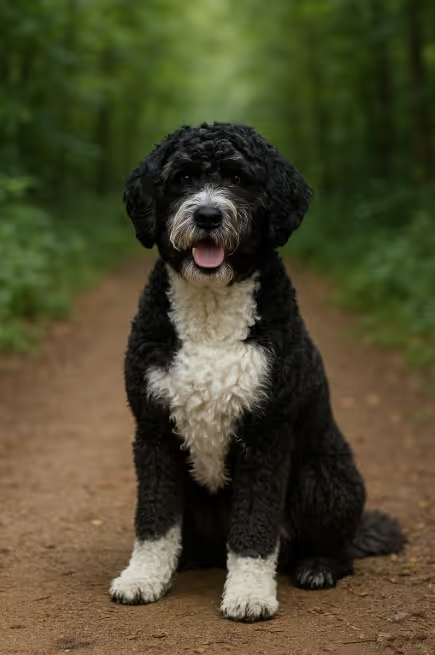The Portuguese Water Dog (PWD) is a bright, athletic, and people-focused working dog from Portugal’s Atlantic coast. Famous for its waterproof curls and love of swimming, this low-shedding breed excels at water work, agility, obedience, and life with active families. If you’re asking “Are Portuguese Water Dogs hypoallergenic?”—they’re low-shedding and often better for allergy-sensitive homes, but no dog is 100% hypoallergenic. Ideal for owners who can provide daily exercise, grooming, and lots of together time.

Developed along Portugal’s Algarve and Atlantic coast, the PWD worked on fishing boats for centuries: driving fish into nets, retrieving gear, couriering messages between vessels, and even guarding the catch. As mechanized fishing grew, numbers declined until fanciers revived the breed in the mid-20th century. The modern standard recognizes two coat types (curly and wavy) and two traditional clips (lion and retriever). The breed gained North American popularity in the late 20th century and is now a beloved performance and family dog while retaining its strong water instincts.
A robust, medium-sized, web-footed swimmer with a single, water-resistant coat.
Low-shedding does not mean low-maintenance—routine care keeps coats healthy and tangle-free.
An energetic working dog that thrives with daily outlets on land and water.
Highly intelligent, eager, and sometimes cheeky—make training upbeat and varied.
Fuel the athlete while keeping a lean, swim-ready physique.
Generally healthy, but responsible breeding and screening matter.
Look for health-tested lines and breeder support—or consider rescue.
Are Portuguese Water Dogs hypoallergenic?
They’re low-shedding and often better for allergy-sensitive homes, but no breed is truly hypoallergenic—meet one before committing.
How much exercise does a Portuguese Water Dog need?
Plan for 60–90 minutes daily, ideally with swimming or vigorous play plus training.
Do Portuguese Water Dogs bark a lot?
They’re expressive watchdogs; teach a “quiet” cue and provide adequate exercise to reduce nuisance barking.
What’s the difference between the lion clip and retriever clip?
Lion: hindquarters and muzzle clipped short, mane and tail plume left long (traditional for water work). Retriever: even length over the body for a tidy, athletic outline.
Do Portuguese Water Dogs shed?
Very little—hair grows continuously and is removed during grooming. Regular brushing prevents mats.
Are PWDs good with kids and other pets?
Yes—affectionate and playful with proper socialization; supervise around small children due to enthusiasm.
Can a Portuguese Water Dog live in an apartment?
Yes, if you meet daily exercise and mental-stimulation needs; otherwise they may become noisy or restless.
What health tests should I ask a breeder about?
Hips, ophthalmologist (CAER), and DNA screening for PRA, JDCM, and GM1; ask about Addison’s awareness in the line.